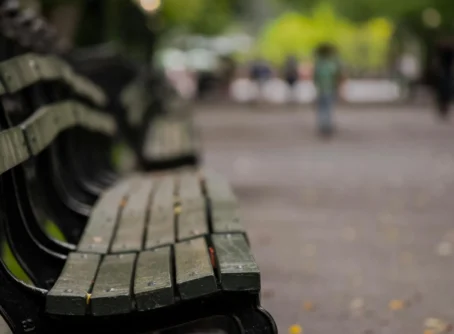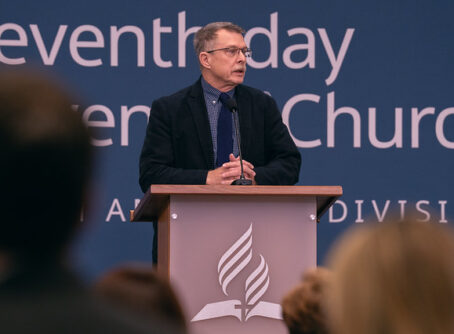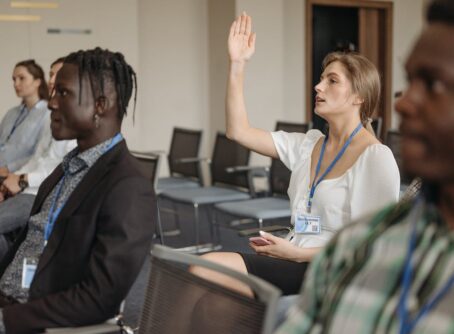
This interview is another part of our series on diversion programs and juvenile justice, exploring how institutions and individuals can help redirect youth from justice system involvement.
Joya Schreurs: To begin, can you give us an overview of your connection to the community of Allison Hill, Harrisburg and how that led to your current leadership of the Rock City Learning Center?
Pastor Joshua Robertson: I was born and raised in the Allison Hill community, so it’s near and dear to my heart. I grew up here with my mother and father. My dad’s a pastor, so I’ve been in church my entire life. I was a pretty god athlete; I played basketball and football. My first college was Gardner-Webb University, which was not my choice. I couldn’t pass the SAT, so I missed out on about 25 Division 1A offers out of high school. So, I went to a Division 1 AA school, played my freshman year, and then failed out with a .67 GPA.
In November of 2004, I met the bishop of a church in North Carolina when I was playing the organ there. He calls me in January and he asks “when are you coming back down to school?” I said “I failed out. I’m not coming back down there.” What he didn’t know was that when he called me, I was helping a guy take about $50,000 worth of heroin to Altoona, Pennsylvania. This bishop didn’t know that, right? But he just started saying to me, “whatever you’re doing right now, you’re about to ruin your life, aren’t you?” He said that about five times, and by the fifth time I was crying. He pleaded with me to come back down there, and he said, “we’ll figure it out together.” Well, I went back down there. He enrolled us both into Cleveland Area Community College in Shelby, North Carolina. And that semester, he taught me how to read.
A part of my story that people don’t know is that I didn’t know how to read until I was 19. I was such an athlete that they just pushed me along through high school. I had coaches—high school and middle school coaches—coming to recruit me in 3rd grade from my parents’ house. No one knew I couldn’t read, and then the bishop spotted it. Now I have my bachelor’s degree and my master’s degree.
But [what I do now at] the Rock City Learning Center is what that bishop did for me when I was 19. I’m doing that for kids in my neighborhood. I’m obligated to serve this community because I know the equity in this community is the genius in the kids. These kids have such a vision for their life but don’t necessarily have the resources or the people in their life steering them in the right direction. I can see myself in them.
That’s why I am a pastor comma, not pastor period, because I like to do more than help people worship. I like to help people. That’s why this church exists.
JS: Thank you for sharing your story! It definitely shows your deep connection to Allison Hill and gives some background to your work. How does the Learning Center serve as an early intervention or diversion community for these youth?
Robertson: I don’t like calling it a diversion or thinking of it in terms of the justice system, because a lot of these kids are traumatized by that. I know a lot of people who deal drugs and are a part of gangs. I grew up in this neighborhood. I still go to the barber shop where everybody hangs at. I’m a lifer here. These are my people, but no one who is in that lifestyle really wants to be there. It’s glamorous and everything, but it’s a lifestyle of paranoia. It’s a really grueling life, and it does a lot of harm to them. So, a lot of our young people see that. They love positive language, and so they say “this is an opportunity.” Some of them only know their dad behind plexiglass, or they only know their mom in a rehabilitation facility. So it is a diversion, yet we don’t look at it as a diversion, but more so as hope.
I really am careful about the language because sometimes terms can carry stigmas, and we’re dealing with traumatized people. If they don’t have any hope for the future, then you’re talking about people who have lost hope and are traumatized. What do you expect them to do? They’re going to hurt each other. So we give them opportunities and options and help them to explore.
JS: That’s a good distinction. It’s helpful to frame the work of the program positively, as what it’s going toward, and not negatively, or what it’s directing away from. Can you tell us what a typical day is like for kids at the Learning Center and how the logistical side of the program works?
Robertson: It’s homeschool at the church. The kids come to us from 8:00 AM to 3:00 PM Monday through Friday. Ages 6 to 18. We really only take 6 to 13, but initially we allowed in some who were older than that, and so we let them graduate. They come in at 8:00 AM and we give them breakfast. Sometimes we have a van that goes and picks up the kids because some of the kids would not be here if we didn’t go and pick them up. You know, we’re dealing with kids who are from the inner city. No one comes to us passing and doing well in school. We get the kids whose parents don’t know what to do with them. After they get some breakfast, they’re enrolled in a cyber charter school, a public school education. They come to us voluntarily to get supportive services.
So, we hire members of the church and the community who will come in here and do like parents do. The kid will, let’s say at 8:45, go into their live lesson, which is online. They’re there with their classmates, their teacher and our Learning Guides. Each room has a Learning Guide in them, and it’s about a 10:1 ratio. Let’s say 8:45 to 9:20, they’re in that live lesson. From 9:20 AM to 11:00 AM they could work on homework assignments or study for a test or they could take a music lesson. We provide that, or we have extracurricular programs like a STEAM program and the Young Entrepreneurship Series. Then they go to lunch. They go outside, they have a good time. They have a gym class, and then they come back in and do their live lessons, and that’s how the day is.
In our first year, we started out with nine children. One of them was my child, and that was the only child who came into the Learning Center passing. We grew to 30 kids and, out of those 30 kids, 29 were failing when they came to us. 10 out of those 30 finished the year above 90%, 12 above 80%, 6 above 70%, and 2 above 60%. And so now this year, which is our second year, 90% of our kids finished above 70%, and 51% of them finished the year above 90%, averaging 90% for the year across all subjects too. You’re talking about dramatic academic success.
This coming fall, we’re going to be expanding. We’ll have 6 learning centers open, so we’ll go from about 36 kids in our one Learning Center to about 220 this coming fall. So, we’ll work toward that. They’re going to be replicating what we do.
JS: Will these other learning centers be in the Harrisburg community?
Robertson: Not all of them. But we’re establishing 3 more in the Harrisburg Community and then 2 in York, which is about 30 minutes away from us. And we have a waiting list of about 20 something pastors who want to do the same thing. You go to churches across the country that Monday through Friday, there’s Sunday school rooms or conference rooms, 8:00 AM to 3:00 PM, that sit empty, and with the relationship with the cyber charter school that we’re partnering with, we have a model that is successful, sustainable and safe. They’re in churches as opposed to school buildings. We’re able to secure the students differently. It’s the convergence of the community and the church.
JS: To reach the Learning Center, do students usually come through school or parental referrals?
Robertson: It’s mainly been through parents. Sometimes the school will suggest someone. There’s nothing in this world like a parent saying “I thought my kid had a learning disability, and now they’re on the honor roll.” So that word of mouth has really been what has populated our Learning Center.
One of the things that we offer here is a customizable experience. If you do well, you tell us what you’re interested in, and we’ll pair you with that. For example, one of the students graduated this year, she’s 18 years old. She’s interested in cosmetology. She had to get one of her grades to an 87% or something like that, and when she did that, we brought in a cosmetology professional, and she spent two hours of her Friday with that person. We are big on what you’re envisioning. What is it that you see for yourself? Let’s pair you with that. So, we incentivize academic success with the ability to explore. For instance, a guy had a goal to raise his grade and then we’d play Madden. Well, three weeks after that, we found someone to come in and teach how to do gaming, like how to create the game. We actually bussed him and four or five kids out to the guy. They got a chance to see how video games are created.
JS: What influence do you hope that the Rock City Learning Center and the coming learning centers have on the broader community? Or, how have you seen the Learning center influence the broader community?
Robertson: The network that we’re putting together is called Black Pastors United for Education. That’s going to be the network for the different pastors and churches. I think we are poised to lift our voice in a neutral way to educate our community about the laws that impact us, specifically educational laws.
I think that the pastors in this network can have town hall meetings where we invite our government officials, people who are in politics, so that they can explain to us public policies that impact us. And the pastor can be a neutral voice to help educate his congregation. So 6 churches, with an average congregation size between 70 to 120 people? Well, you’re talking about close to 500 people. Let’s say we have 25 learning centers right now. You’re talking about a significant footprint of people who care about our youth, who care about the laws that impact us, and so we can do more than educate, we can really help our world around us, be united around some of the issues that impact us so dearly, which is our youth. I truly believe that the church, the community, and our are the trustees of our children’s future. And so how we steward this opportunity is everything.
JS: Yeah, that’s excellent. You mentioned at the beginning that you think of yourself as a pastor comma and not just a pastor period — how does your role as a pastor inform or connect to the work that you do with the Learning Center?
Robertson: Sure, it’s a big role. Some days I’m pastor-father, right? I don’t believe in just preaching to you. I believe in crying with you when you’re crying. I believe in being hopeful when you feel like you’ve lost hope. I believe in holding you accountable to what you’re saying. Some days it’s like that, some other days it’s like big brother, and we’re just hanging out. But then I’m also a CEO, and I have to run the business of the Learning Center. I have to raise funds and I have to do my executive work. Then I’m in operations. I’m here on the site sometimes with the Learning Center. I’m in the community and I’m building relationships with people.
So there’s a lot of different things that I do to help make this work, but if I had to tell you what I think it’s the most important is, I mentor, train, and produce leaders. I believe if you want your work to transcend generationally, you gotta put it in an institution and you have to train people who can serve the institution because the institution will live long beyond you. And so, I think that if the church thinks about her ministries in the sense of how we reach the community, the community will never go without need.
JS: Something that struck me from the Learning Center website was that an objective of the Learning Center is to “enable children to grow into loving citizens of our beloved community.” Can you speak to how the services and the structure of the Learning Center actualize this goal? Or, how the Learning Center helps youth connect to Allison Hill and feel a stake in their community?
Robertson: So, for instance, right now we have 12 youth from our community in an apprenticeship program, the Young Entrepreneurship Series. They’re paid $200.00 a week, Monday through Thursday, and they are at two other churches right now, learning how to lay a floor, learning how to paint, and how to run a payroll system. They also learn how to start an LLC, and how to serve as a board member on a 501(c)3. Why are we doing that? Well, my hope is that in about 15 to 20 years that we are buying property throughout the city of Harrisburg to provide affordable housing, that they would do the same, that we would give them skills that they could do that and then build up their community.
These skills that they’re learning now, if we teach them correctly, will lead them later in life to be able to build their community. I’m trying to give them a vision for the future.I think what we’re doing now helps them to imagine themselves in the future. If they can see themselves in the future and see themselves using the skills that they have now, just on a different level, then we give them every incentive to make right decisions.
JS: Can you tell us more about the mentorship model of the Learning Center? Who are your Learning Guides, and what does their job entail?
Robertson: I will only look for people who are not going to fail on my watch. The Learning Guide has to be that type of person. They happen to be members of the church. But we’ve got 8 hours with these kids five days a week. We work at least 40 hours a week. Think of how much that shapes our lives. You can really shape a kid’s life. I start with members of my church, and then I go to members of the community, but the only thing I’m looking for is that grit.
I also think that the presence of men is vitally important. Men have to step up because there’s a certain atmosphere that is produced when there’s the balance of men and women. So that’s what I look for in my staff, that balance.
Let me say one other piece about that. The church I serve is a multicultural church in the middle of the hood, and that throws a lot of people when they come to our church. There is White, Black, Hispanic, Asian, African, Caribbean. I mean, you name it. They’re all in here. So it’s not just Black or White in the Learning Center. I think the diversity really is an aspect of our church and our Learning Center, because now it helps our children to engage with different cultures, different people, and it can destroy some of the stereotypes that are attached to people of different races.
JS: To close, what role do you think that church or faith-based institutions can play in this kind of work with youth? What can Christians or Christian organizations bring to the table? And then, what might you say to Christians who are contemplating joining in this kind of work?
Robertson: Jesus said that they will know that you’re his disciples by how you love one another. Us loving one another as a staff is our number one evangelistic witness, right? So when the kids and their parents come in here, and they see this profound love that we have as a staff and a team, that’s our strategy for evangelism. That’s why we don’t have to have a Christian class. We don’t have to say a public prayer. So the first thing is this shift in the mindset that God doesn’t ask us to be successful—he asks us to be faithful. I think faith-based organizations and churches have to say that the world that we live in is in trouble. And so how does Jesus, or whatever faith tradition you believe in, whatever that is, how does it prompt you to action—intentional, strategic, collaborative action?
I think the church plays a pivotal role, and I think the pastor plays a pivotal role in leading a church to think beyond the church’s comforts and conveniences and daily or weekly traditions. And you know, to think about how we can critically engage. It’s one thing to have a food pantry. I love that. We had one here too. It’s one thing to have a clothing connection. We had that too, right? We did that. But in 10 years, the same people shouldn’t be coming to the food. How do we empower them? How do we move beyond relief services to empowerment, to build a community together? I think that’s what the church has to be thinking about. What can we do to be intricately involved in the community? To help build a community where we all feel safe and all are proud to live in.
JS: Is there anything you haven’t had a chance to say yet today that you’d like to add?
Robertson: This is my passion, and I really love what I’m doing. As uncomfortable as I am about it to some degree, I add my story because I think my story is how you get to my heart. I would want churches who may hear this or whatever to make contact, right? It may not be a Learning Center, but I want to connect with pastors and churches who are thinking critically about engaging our community on a level like how we’re able to do. We’re engaged with people who don’t go to our church to empower them. I would love to connect with pastors or churches that are thinking about that and want to think through those things together. That’s where my heart is.
Pastor Joshua Robertson is the senior pastor at Rock City Church in Harrisburg, Pennsylvania. He is also the CEO of the umbrella organization Black Pastors United for Education, which includes the Rock City Learning Center.
Joya Schreurs is a senior at Dordt University, where she studies English and Theology. She also worked as a Shared Justice intern in the summer of 2023.





